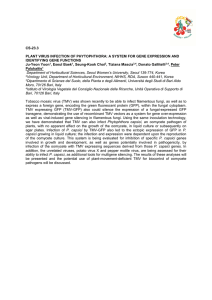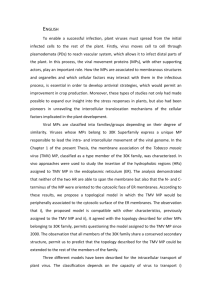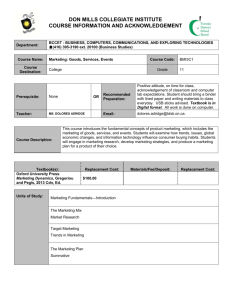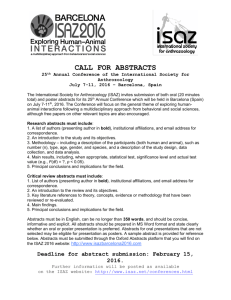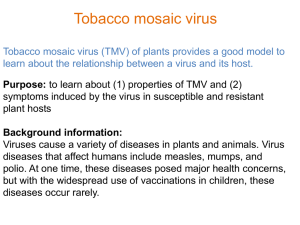DEPARTMENT OF SOCIAL AND CULTURAL ANALYSIS
advertisement
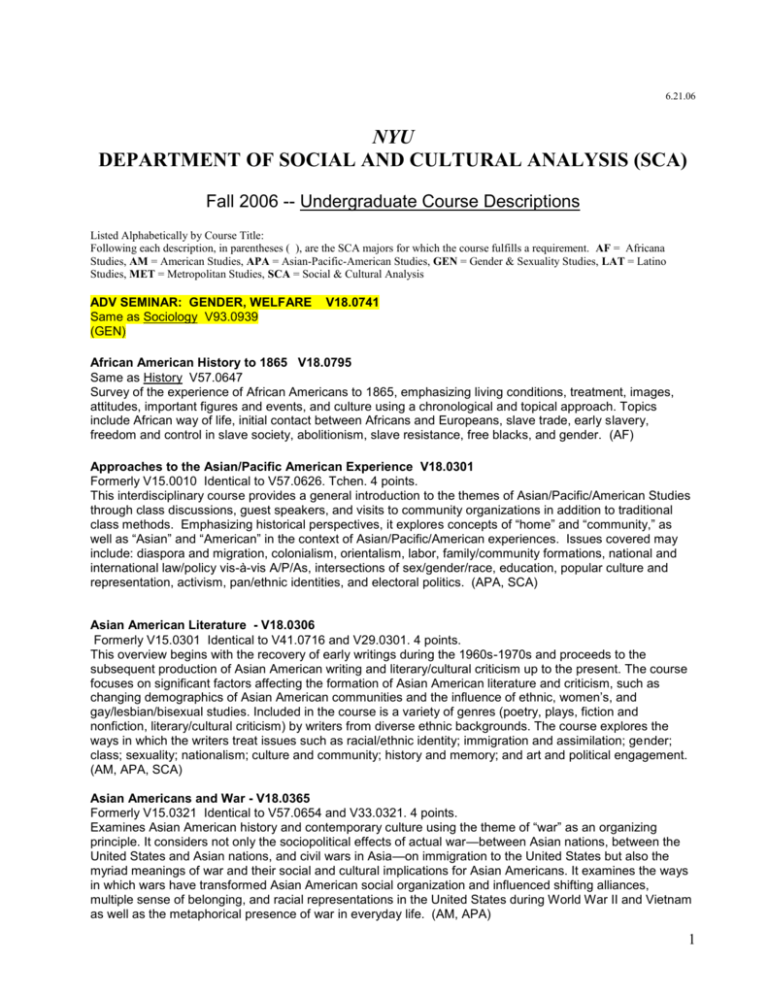
6.21.06 NYU DEPARTMENT OF SOCIAL AND CULTURAL ANALYSIS (SCA) Fall 2006 -- Undergraduate Course Descriptions Listed Alphabetically by Course Title: Following each description, in parentheses ( ), are the SCA majors for which the course fulfills a requirement. AF = Africana Studies, AM = American Studies, APA = Asian-Pacific-American Studies, GEN = Gender & Sexuality Studies, LAT = Latino Studies, MET = Metropolitan Studies, SCA = Social & Cultural Analysis ADV SEMINAR: GENDER, WELFARE Same as Sociology V93.0939 (GEN) V18.0741 African American History to 1865 V18.0795 Same as History V57.0647 Survey of the experience of African Americans to 1865, emphasizing living conditions, treatment, images, attitudes, important figures and events, and culture using a chronological and topical approach. Topics include African way of life, initial contact between Africans and Europeans, slave trade, early slavery, freedom and control in slave society, abolitionism, slave resistance, free blacks, and gender. (AF) Approaches to the Asian/Pacific American Experience V18.0301 Formerly V15.0010 Identical to V57.0626. Tchen. 4 points. This interdisciplinary course provides a general introduction to the themes of Asian/Pacific/American Studies through class discussions, guest speakers, and visits to community organizations in addition to traditional class methods. Emphasizing historical perspectives, it explores concepts of “home” and “community,” as well as “Asian” and “American” in the context of Asian/Pacific/American experiences. Issues covered may include: diaspora and migration, colonialism, orientalism, labor, family/community formations, national and international law/policy vis-à-vis A/P/As, intersections of sex/gender/race, education, popular culture and representation, activism, pan/ethnic identities, and electoral politics. (APA, SCA) Asian American Literature - V18.0306 Formerly V15.0301 Identical to V41.0716 and V29.0301. 4 points. This overview begins with the recovery of early writings during the 1960s-1970s and proceeds to the subsequent production of Asian American writing and literary/cultural criticism up to the present. The course focuses on significant factors affecting the formation of Asian American literature and criticism, such as changing demographics of Asian American communities and the influence of ethnic, women’s, and gay/lesbian/bisexual studies. Included in the course is a variety of genres (poetry, plays, fiction and nonfiction, literary/cultural criticism) by writers from diverse ethnic backgrounds. The course explores the ways in which the writers treat issues such as racial/ethnic identity; immigration and assimilation; gender; class; sexuality; nationalism; culture and community; history and memory; and art and political engagement. (AM, APA, SCA) Asian Americans and War - V18.0365 Formerly V15.0321 Identical to V57.0654 and V33.0321. 4 points. Examines Asian American history and contemporary culture using the theme of “war” as an organizing principle. It considers not only the sociopolitical effects of actual war—between Asian nations, between the United States and Asian nations, and civil wars in Asia—on immigration to the United States but also the myriad meanings of war and their social and cultural implications for Asian Americans. It examines the ways in which wars have transformed Asian American social organization and influenced shifting alliances, multiple sense of belonging, and racial representations in the United States during World War II and Vietnam as well as the metaphorical presence of war in everyday life. (AM, APA) 1 The Black Body and The Lens - V18.0155 (Pending Approval) This interdisciplinary seminar explores the range of ideas and methods used by critical thinkers in addressing the body in photography, video, music, and film. Central to our discussions will be a focus on how the display of the black body affects how we see and interpret the world. Using a series of case studies, we will consider the construction of beauty, gendered images, race, and hip-hop culture. The historical gaze has profoundly determined the visual construction of the black body in contemporary society. The interplay between the historical and the contemporary, between self-presentation and imposed representation--all fundamental to our discussions. The seminar will center the student within the contemporaneous world of image making with an emphasis on the black body. Final projects include an imaging project and/or a written essay. (AF) Black Feminism - V18.0180 This course explores the production and practice of black feminism in the late 19th and 20th century America. We will carefully consider the relationship between social movements and critical theories of power produced by African American women and men over time. We will be examining the written work and the activism of African-American women and will look at the way that theory and practice historically intersected around questions of race gender and power. We are concerned with appreciating black women's critical roles in building, sustaining, and leading black and interracial social movements in the U.S. By situating our readings around major social movements such as the anti-lynching campaigns, the Harlem Renaissance, Garveyism, the Civil Rights movements, or current struggles around globalization, we will be in the position to reconsider the importance of black feminist activism over time and space and to consider the ways in which systems of oppression both produce and block black feminist consciousness. (AF, GEN) Cities in a Global Context - V18.0602 (Recitation required) Formerly V99.0103. 4 points. What is a Global City? How does a global perspective shape our understanding of urban spaces, and the politics of creating social and spatial order in cities? This course draws on ethnographic examples from a range of cultural and geographic contexts to explore twenty-first century urbanization. Through examples that range from Shanghai to Sao Paulo, we will trace how issues like equity, migration, violence, ecology, and citizenship can inform an understanding of modern cities. (MET) City Planning: 19th & 20th Centuries V18.0769 Same as Fine Arts V43.0650. Formerly V99.0650 Prerequisite: V18.0762. Instructor’s permission required. (MET) Concepts In Social And Cultural Analysis V18.0001.001 This course is a gateway to all majors offered by the Department of Social and Cultural Analysis (SCA). It focuses on the core concepts that intersect the constituent programs of SCA: Africana Studies, A/P/A, American Studies, Gender and Sexuality, Latino Studies, and Metropolitan Studies. The course surveys basic approaches to a range of significant analytical concepts (e.g., Property, Work, Technology, Nature, Popular Culture, Consumption, Knowledge), each one considered within a two-week unit. Because the course is team-taught and the instructors for it vary from semester to semester, there will sometimes be slight alteration in the concepts covered in different terms. (AF, AM, APA, GEN, LAT, MET, SCA) The Constitution and People of Color - V18.0366 Formerly V15.0327 Identical to V53.0801, V62.0327. 4 points. Examines how the American legal system decided constitutional challenges affecting the empowerment of African, Latino, and Asian American communities from the 19th century to the present. Topics include the denial of citizenship and naturalization to slaves and immigrants, government-sanctioned segregation, the internment of Japanese Americans during World War II, the prison industry, police brutality, post-9/11 detention issues, and voting rights. Course requirements include attendance at a community function involving constitutional issues, a midterm, and an interactive oral and written final project comparing a present-day issue affecting racial minorities in New York City and proposing measures to collectively address the issue. (APA) 2 Culture of the City: Landscapes of Consumption - V18.0620 Formerly V99.0247. 4 points. Consumption of objects, images, and places is central to the culture and economy of metropolitan life. The class will explore how the relationship between consumption and cities has developed by examining three key moments—the late nineteenth century and the invention of urban commodity spectacles, post-war America and the rise of suburban consumer spaces, and contemporary America and the selling of the commodity city. The class addresses three questions: Why do we want things? How does landscape organize our consumer desires? How does place become an object of consumption? We will begin with an examination of classic theoretical works that probe the relationships between people, things, and cities. We will then embed these in discussions of changing forms and practices of consumption and urbanism. The empirical cases we will examine range from the development of the department store, to the fashioning of commodity home, to the work of shopping, and to the emergence of a thriving urban debt industry. (AM, MET) Decision Making & Urban Design V18.0763 Same as Fine Arts V43.0032. Formerly V99.0321 Prerequisite: V18.0762. Instructor’s permission required. The impact and limitations of private and public decision-making power on urban design and architecture. City architecture in light of the values and priorities set by a society. Recognition of citizens' groups as increasingly important factors in city planning and related changes. Critically evaluates the complexity of decision making and historical circumstances as related to the built urban environment on the basis of historical and modern American and European examples. (MET) Elementary Cantonese I - V18.0331 Formerly V15.0410, Identical to V33.0410. 4 points. An introduction to Cantonese with an emphasis on the spoken and written language and conversational proficiency as a primary goal. The course emphasizes grammar, listening comprehension, and oral expressions. It is designed to give beginning students a practical command of the language. Upon completion of the course, students can expect to converse in simple sentences and recognize and write about 350 Chinese characters. Students with passable conversation ability or native speakers from Cantonese-speaking communities should not enroll in this course. (APA) Elementary Filipino I - V18.0321 Formerly V15.0401, 4 points. An introduction to Filipino with an emphasis on mastering basic grammar skills and working vocabulary. Lessons incorporate discussions on history, current events, literature, pop culture, and native values. The course is open to beginning language students and lessons are modified according to the needs of individual students. Because language is key to connecting with community concerns, the course also includes field trips to Filipino neighborhoods in Queens and Jersey City. (APA) Elementary Hindi/Urdu I - V18.0341 Formerly V15.0405, 0406 Identical to V77.0405. 4 points. (APA) Feminism And Theatre V18.0726 Same as Tisch H28.0623 This class will examine how feminist theory has shaped theatre studies. As such the course will stage and interrogate the shift between theatre and performance, and between textuality and embodiment. We will focus on key issues such as the historical prostitutionalization of women performers, the problems of defining feminism, being in a potentially “post feminist moment,” and the shift towards a "multicultural" theory of identity. The class will dialectically engage the perils of performance for women, as well as the potential for empowerment through feminist theatre. Authors may include Jill Dolan, Tracy Davis, Sue Ellen Case, Judith Butler, Eve Ensler, Wendy Wasserstein, Holly Hughes, Maria Irene Fornes and others. (GEN) Gay And Lesbian Performance Same as Tisch H28.0624 (GEN) V18.0714 3 Infrastructure V18.0768 Same as Fine Arts V43.0036 Prerequisite: V18.0762. Instructor’s permission required. Architecture of modern cities, planning procedures, and technology in terms of their relationship to public health. Topics: building legislation; sanitary engineering; problems of pollution engendered and solved; design of mass housing; design of hospitals, including contemporary controversies and community participation; design and psychological disorder; and medical fact and theory and their relationship to architectural design. (MET) Interdisciplinary Perspectives on Metropolitan Studies - V18.0601 *Recitation required Formerly V99.0101 and identical to MAP course V55.0631. 4 points. A broad and interdisciplinary introduction to the field of urban studies. Surveying the major approaches deployed to investigate the urban experience in the social space of the modern city. This course explores the historical geography of capitalist urbanization with attention to North American and European cities, to colonial and postcolonial cities, and to the global contexts of urban development. Major topics include urban politics and governance; suburban and regional development; urban social movements; urban planning; the gendering of urban space and racial segregation in urban space. (MET, SCA) Intermediate Cantonese I V18.0333, 0334 Formerly V15.0412, Identical to V33.0412. 4 points. This is an advanced-level language and culture course following Elementary Cantonese. At this level, when the basic skills and working vocabulary have been mastered, emphasis is placed on the linguistic rules to enable students to communicate with more competence. The lessons focus not only on language, but also use a holistic approach and incorporate discussions on history, current events, literature, pop culture, and native values. Because language is key to connecting with community concerns, the course also includes field trips to Chinatown and other Cantonese-speaking neighborhoods. (APA) Intermediate Filipino I - V18.0323 Formerly V15.0403, 4 points. At this level, when the basic skills and working vocabulary have been mastered, emphasis can be placed on the linguistic rules to enable the student to communicate with more competence. There is also focus on translation. Lessons use a holistic approach and incorporate discussions on history, current events, literature, pop culture, and native values. To observe and experience the language at work, the course includes field trips to Filipino centers in the New York-New Jersey area as well as invited guests who converse with students in Filipino about their life and work. (APA) Intermediate Hindi/Urdu I - V18.0343 Formerly V15.0407, 0408 Identical to V77.0407. 4 points. (APA) Internship Program The internship complements and enhances the formal course work of the SCA majors. Students intern at agencies dealing with a range of issues pertaining to their major and take a co-requisite seminar that enables them to focus the work experience in meaningful academic terms. The goals of the internship are threefold: (1) to allow students to apply the theory they have gained through course work, (2) to provide students with the analytical tools, and (3) to assist students in exploring professional career paths. Internship Fieldwork V18.0040 Corequisite: V18.0042. 2 or 4 points. Ten hours of fieldwork are required for 2 points, fifteen hours for 4 points. (AF, AM, APA, GEN, LAT, MET, SCA) Internship Seminar V18.0042 Corequisite: V18.0040. Prerequisites: majors must have taken one course in the introductory sequence and one elective. There are no prerequisites for non-majors except that they be in their junior year. (MET) 4 Intersections: Gender, Race, and Sexuality in U.S. History and Politics - V18.0230 Formerly V13.0301, Gender and Cultural History. Prerequisite: V18.0201 Duggan. 4 points. **Recitation Required** Drawing on the histories of African, Asian, Latino, European, and Native Americans of both genders and many sexualities, the course explores the complex and important intersection of gender, race, and sexuality in the United States from the 17th century through the 20th, in historically related case studies. Starting in the period of European imperialism in the Americas, it examines the ways that gender, race, and sexuality shaped cultural and political policies and debates surrounding the Salem witch trials; slavery, abolition, and lynching; U.S. imperialism in Puerto Rico and Hawaii; the politics of welfare and reproduction; cultural constructions of manliness, masculinity, and citizenship; and responses to the AIDS pandemic in a global context. (AF, AM, APA, GEN, LAT, SCA) Intro To Grassroots Organizing - Gallatin K45.1449 Activists seeking progressive social change face daunting obstacles: limited resources, cynicism about the possibilities for social change, conservative worldviews, and powerful opponents, to name a few. To have an impact under these conditions, activists need to learn how to think strategically about how to bring community members together to win changes in oppressive institutions and policies through their own action. This course is an introduction to the nuts and bolts of grassroots organizing. After studying alternative models of community organizing, we will look at how organizers involve community members, select issues, develop local leadership, and plan effective campaign strategies and tactics. We will draw upon organizing theory, case studies, interactive trainings, films on community and labor struggles, conversations with organizers, and observation of community organizing in the field. Readings include Rinku Sen’s Stir It Up: Lessons in Community Organizing and Advocacy; Kim Bobo, et. al., Organizing for Social Change; and Saul Alinsky, Rules for Radicals. Prior experience in campus or community organizing is desirable but not necessary. (MET) Introduction to Pan-Africanism - V18.0104 Formerly V11.0010 Offered once a year. 4 points. This course deals with the major themes and ideas in Pan-African thought. More than a historical survey, it attempts to examine the impact of a range of intellectuals and artists on the issues of race, resistance and identity. Readings will be drawn from the works of thinkers as linguistically and ideologically diverse as C.L.R. James, Jean-Paul Sartre, James Baldwin, Aime Cesaire, Frantz Fanon and Jean Price-Mars among others. These readings will serve as much to introduce essentialist theories of racial unity as they will be a reaction against the ideal of a single monolithic black culture. The course will also relate Pan-Africanism to other modern political and cultural movements such as Surrealism, nationalism, and Marxism, as well as examine its evolution in the Americas. (AF, SCA) Introduction to Swahili I - V18.0121 Formerly V11.0201 Offered once a year. 4 points. Provides students with an elementary understanding of Swahili, a Bantu language with a rich oral and written tradition that is spoken by about 100 million people from Somalia to Mozambique and Zanzibar. After a short presentation of Swahili’s history, codification, and relation to other languages, students are drilled in phonetics and grammar. They are also introduced to some poems, songs, and oral narratives. (AF, SCA) Language And Society V18.0701 *Recitation required. Same as Linguistics V61.0015 Considers contemporary issues in the interaction of language and society, particularly work on speech variation and social structure. Focuses on ways in which social factors affect language. Topics include language as a social and political issue; regional, social, and ethnic speech varieties; bilingualism; pidgin and creole languages. (GEN) Latino/A Popular Culture V18.0534 (proposed) From Spanish hip hop to Raggaeton Latinos are at the heart of numerous genres of popular culture production. This course will examine contemporary popular culture products by and for Latinos looking in particular at issues of production, circulation and consumption. Is popular culture a site of Latino/a cultural expression, how and in what ways. How is it circulated and consumed, how is it mediated by different culture industries? What do we even mean with Latino popular culture. These and more questions will be considered through a range of interdisciplinary studies. (LAT) 5 Law And Community Activism - Gallatin K45.1452 As activists and members of society we are confronted by laws all of the time, though we rarely see ourselves as actors in relationship to these laws. Why is that? We are taught that rights have been given by progressive courts, rather than won by popular struggle. Where do rights come from? Are they the same as laws? In this course we will examine the role of popular resistance and its relationship to laws. We will examine concepts of justice, law, obedience and disobedience as we work with community-based organizations. Through our study and discussions in class we will create a base for working in the community, and from working in the community we will create more of an understanding of theory. Three areas students can choose to work in are: community groups using the legal system to advance their goals, groups mobilizing community support to defend against unjust laws, and groups using international human rights standards to shift the discourse around the issue of rights. Readings will range from Howard Zinn and Emma Goldman, to David Kairys and Patricia Williams, as well as excerpts from political trials. We will also read reflections from community groups working with or against laws and segments of legal decisions. (MET) Law And Society V18.0722 Same as Politics V53.0335 Critically examines the relationship between law and political and social movements such as the civil rights movement, the women's movement, and the labor and environmental movements. Emphasis on law as a political process and legal remedies for racial and gender discrimination and class action torts. Deals with the politics of rights and the limits and possibilities of law as a process for social change. (GEN, MET) Law and Urban Problems - V18.0610 Formerly V99.0232. 4 points. Interdisciplinary introduction to the law as it interacts with society. Analysis focuses on problems in areas such as housing, zoning, welfare, and consumer affairs, emphasizing the underlying social, economic, and political causes of the problems and the responses made by lawmakers and courts. Readings are drawn from the law and social science. No specific knowledge of law is required. (AM, MET) Mapping For Social Change Gallatin K45.1420 The goal for this course is to learn how to use Geographic Information Systems (GIS), the state of the art in mapping technology, as a tool for community organizing and public policy analysis. Among the specific skills we’ll learn are how to geocode addresses, and how to do spatial analysis to measure whether communities needs are being met or not. And last but not least, we will also learn how to use census data to map the racial and income composition of NY neighborhoods. The semester ends with a closer look at the uses and limitation of GIS for helping communities mobilize to improve their day-to-day lives and to enhance their capacity to influence over time the future trajectories of politics, markets, and civic life. (MET) Modern South Africa V18.0792 Same as History V57.0568 Exploration and analysis of the political, social, and economic development of African nations south of the Zambezi River from 1700 to the present. Focuses on South Africa, Namibia, Zimbabwe, Botswana, and Mozambique. (AF) Politics Of Caribbean Nations V18.0802 Same as Politics V53.0532 Analysis of the political culture and institutions of Cuba, the Dominican Republic, Puerto Rico, Haiti, Jamaica, and Trinidad and Tobago. Concentration on the study of specific countries is possible and requires a research paper in addition to other requirements. Attention to the communities of Caribbean nationals in the United States to the extent that the study of these communities is relevant to internal political processes. (AF) Poverty And Income Distribution V18.0718 Same as Economics V31.0233 Defines poverty and welfare. Analyzes who the poor are, why some people are rich and others poor, equality of opportunity, income and status, inequality, trends in the degree of inequality, government’s role in income distribution, and international comparisons of inequality. (GEN) 6 Race and Rumors of Race - V18.0154 (Pending Approval) This is a multidisciplinary reading, writing, and discussion course on the concept of race. Though the focus will be on “blackness” and “whiteness” in the United States, there will be some comparison with Brazil. We will also pay some attention to those who have traditionally rejected the racial identities imposed upon them and have suffered the consequences. The name of the course is borrowed from the title of a book written by Howard Washington Odum and published by the University of North Carolina Press in 1943. (AF) Reading Race and Representation - V18.0368 Formerly V15.0603 Identical to V41.0058. 4 points. This seminar centers on “reading race” as it is variously theorized in a range of cultural productions (fiction, personal essays, cultural/literary criticism, sociology, independent films, and pop culture). The emphasis on Asian American work is situated within a comparative framework that includes writers and filmmakers from diverse backgrounds who explore ways of analyzing “differences.” Part of the course is devoted to examining re-readings of race that have significantly redefined the “canon” of American literature. Looks at how the relationship between racial “representation” (political, demographic, social historical, and cultural) and constructions of national identity has been interrogated, especially in reference to the politics of “multicultural literacy. (AF, APA) Representations Of Women V18.0734 Same as English V47.0755 Selected readings in British and American poetry and fiction provide the focus for an exploration of woman’s place in the writings of such authors as Jane Austen, the Brontës, George Eliot, Elizabeth Barrett Browning, Virginia Woolf, Edith Wharton, Emily Dickinson, Kate Chopin, Willa Cather, Gertrude Stein, Lillian Hellman, Doris Lessing, Sylvia Plath, Adrienne Rich, and others. (GEN) Rights & Resistance: Theatre & Film In Latin America Tisch Drama H28.0748 This course offers an introduction to Latin/o American theatre and film texts that illuminate cultural and political movements in the Americas during the 20th century. We study the ways in which film and theatre address and express crises of social conflict. Drawing on postcolonial and liberation theories of culture, art, and the state, we construct an intellectual history of socially-motivated Latin/o American film and theatre performances. (LAT) Senior Research Seminar V18.0090 Prerequisites V18.0001, V18.0020 and one of the following introductory courses: V18.0101, V18.0201, V18.0301, V18.0401, V18.0502 or V18.0601. This is an advanced research in Social and Cultural Analysis, which culminates in each student completing an extended research paper that makes use of various methodology skills. Students work individually and collaboratively on part of a class research project on pertaining to the major in Social and Cultural Analysis or the program in Africana Studies, American Studies, Asian/Pacific/American Studies, Gender and sexuality Studies, Latino Studies or Metropolitan Studies. Majors must enroll in fall of their senior year. (AF, AM, APA, GEN, LAT, MET, SCA) Senior Honors Thesis V18.0092 Departmental Honors in Social and Cultural Analysis–as in all the majors administered within SCA–requires a minimum of three courses with honors designations: An honors section of Strategies for Social and Cultural Analysis, in which students will design their thesis research projects (or preliminary versions thereof) will normally be taken in the sophomore or junior year. In the senior year, students will take a two-semester Honors sequence, consisting of a fall Honors section of the Senior Research Seminar (V18.0900) and spring Independent Honors Research (8 credits total), in which they will complete a substantive research project with a significant component based on original primary research. Additional honors credit may be taken in honors sections of the introductory Concepts course, in designated sections of other Departmental courses, or in interdisciplinary Departmental honors junior seminars, when offered. (AF, AM, APA, GEN, LAT, MET, SCA) 7 Sex, Gender and The Bible V18.0743 Same as Hebrew and Judaic V78.0019 (GEN) Sexual Diversity And Society V18.0725 Same as Sociology V93.0511 Variation in human sexuality. Explores the social nature of sexual expression and how one arrives at erotic object choice and identity. Past and contemporary explanations for sexual variation. Heterosexuality, homosexuality, bisexuality, transvestism, transgenderism, incest, sadomasochism, rape, prostitution, and pornography. Origin of sexual norms and prejudices. Lifestyles in the social worlds of sexual minorities. Problems of sexual minorities in such institutions as religion, marriage, polity, economy, military, prison, and laws. The politics of sex. (GEN) Shaping The Urban Environment Fine Arts V43.0021.003 Students investigate the city in terms of architectural history, engineering, and urban planning. Topics: historical types and shapes of cities, factors influencing our current urban scene, architectural form as expression of political systems, discussions of urban design and architecture problems in the contemporary world, and the role of technological factors such as construction and transportation systems. Students are given projects in conjunction with class. (MET) Strategies for Social and Cultural Analysis - V18.0020 This course explores various research methodologies that scholars and practitioners employ to answer both historical and contemporary questions. Throughout the semester seminar participants will be introduced to four broad categories of strategies for social and cultural analysis: historical analysis, particularly archival research; literary analysis, which deals primarily with critical analysis of texts; social science methods, focusing on the collection and interpretation of data and quantitative methods; and ethnography, along with other forms of fieldwork. In each of the four sections of the course, students will grapple with both the theory and the application of the methodology being considered, and are encouraged to think carefully about which strategy or strategies are most appropriate for his or her own research projects. (AF, AM, APA, GEN, LAT, MET, SCA) Topics: Caribbean Literature: Ancestors Plus V18.0780-001 Same as Comp Lit V29.0132 (AF) Topics in Caribbean Literature: Novel & Phil/Hist V18.0780Same as Comp Lit V29.0132 (AF) Topics: Latino Expressive Culture and Literature - V18.0541 (LAT) Topics: Francophone Caribbean Literature V18.0816 Same as French V45.0868 The inaccessibility of the past, the longing for a lost wholeness, the nostalgia for origins and a sense of the constructed nature of political reality are major themes in the writing of the francophone Caribbean. This course will examine the way in which five Caribbean novelists deal with the question of time, memory and the writing of the self. The auto-biographical thrust in these novels from Haiti, Guadeloupe and Martinique inevitably focuses less on individual lives than a collective experience, less on place than on displacement, less on memory than the problematic nature of summoning up the past. Politically as much as esthetically subversive, these texts function ideologically to unmask colonial subjectivity, interrogate the idea of belonging, call into question the traditional associations of childhood and dramatize the difficulty of recovering the past. (AF) 8 Topics: Marxism and Post Colonial Theory V18.0280 Formerly V13.0400. Same as, English V41.0975 (AM) Urban Economics V18.0751 Same as Economics V31.0227 Formerly V99.0231 Prerequisite: V31.0002 or equivalent The city as an economic organization. Urbanization trends, functional specialization, and the nature of growth within the city; organization of economic activity within the city and its outlying areas, the organization of the labor market, and problems of urban poverty; the urban public economy; housing and land-use problems; transportation problems; and special problems within the public sector. (MET) Women In American Society V18.0727 Same as History V57.0635 Permission of instructor required. This course has two themes: how maleness and femaleness (gender) have changed in the last 150 years, and how women’s lives in particular have been transformed. It emphasizes not only the malleability of gender, but also the way that gender systems have varied in different class, race, ethnic and religious groups. We look at women and gender in politics, in work, in family and personal relationships, in sexuality and in culture. (GEN) Women Writers in Contemporary Italy Same as Italian V59.0278 (GEN) V18.0826 Women Writers In France V18.0740 Same as French V45.0935 The rich and diverse literary works by women express their individuality and their important social and cultural role in France from the 12th century to the present. The course studies both the changing sociohistorical context of these writers and the common problems and themes that constitute a female tradition. Writers include Marie de France, Christine de Pisan, Marguerite de Navarre, Mme. de Sévigné, Germaine de Staël, George Sand, Colette, Simone de Beauvoir, and Marguerite Duras. (GEN) World Cultures: Contemporary Latino Culture – V55.0529 (MAP) In this course we will study today’s Latino cultural expressions and identities in historical perspective. We will begin with an overview of Latin American cultural theory going back to the time of the Spanish conquest, and including such thinkers as Bartolomé de las Casas, Sor Juana Inés de la Cruz, Simón Bolívar, José Martí and José Vasconcelos. We will then trace the development on Latino cultural experiences in the United States during the 20th century, with special attention to the dramatic political and cultural movements of the 1960s and 1970s. The latter part of the course will address Latino cultural theories and practices in the contemporary period; of central concern will be the idea of a pan-ethnic “Latino” identity encompassing all of the diverse national groups. We will study instances of this new situation in music, literature, performance and media representation. (LAT, SCA) 9 NYU ABROAD Florence: CULTURE OF THE CITY: ITALIAN URBAN LIFE V18.9620 Formerly V99.9247 (MET) Ghana DOCUMENTING THE AFRICAN CITY V11.9424 (AF, MET) London: CITY PLANNING: SOC & CULT ASPECTS OF LONDON V18.9630 Formerly V99.9280 BRITISH ART & ARCHITECTURE IN LONDON V43.9011 IDEOLOGY & URBAN DESIGN: BUILDERS OF BRITAIN V43.9035 ARCHITECTURE IN LONDON…V43.9671 A HISTORY OF LONDON – V43.9127 Paris: BUILDINGS. LANDSCAPES & CITIES V45.9116 (MET) PARIS MONUMENTS & POLITICAL POWER …V45.9350 (MET) FRENCH/AFRICAN RELATIONS V18.9914 (AF) Prague: CULTURAL HISTORY V57.9090 (MET) 10
